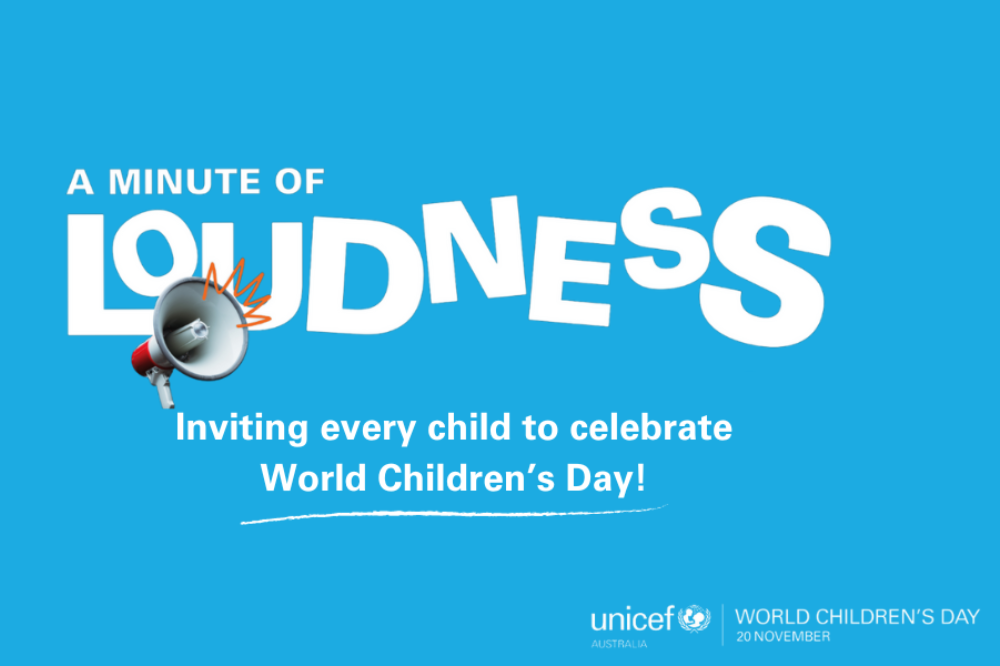
We have Mother’s Day and Father’s Day, but what about Children’s Day? It does exist – and this year, it’s all about encouraging children to raise their voices and speak up.
First established in 1954, World Children’s Day is celebrated on 20 November, the day the UN General Assembly adopted the Declaration of the Rights of the Child. UNICEF Australia believes that every child should have the chance to speak up about issues they care about.
That's why for World Children’s Day, UNICEF Australia is inviting every child to make noise during A Minute of Loudness, where they will be encouraged to raise their voices about what matters to them. In a world where children are too often told to be quiet, UNICEF Australia is handing over the microphone and giving them the opportunity to be heard.
At 10am on 20 November, schools are being invited to participate in A Minute of Loudness – a moment of collective joy and celebration. Children across Australia can join a powerful minute of cheers, claps and songs, making noise about issues that matter to them.
According to Jennifer Trigg, Community Fundraising Manager at UNICEF Australia, the Minute of Loudness campaign was created to connect directly with students and to give them the opportunity to speak up about the issues that impact them the most.
“We really wanted to give schools something that they can get behind each year for World Children’s Day,” Trigg explains. “It’s also such a special and easy way to give children a channel for their thoughts and letting them choose how they want to share them.”
In addition to introducing students to UNICEF and its work for the rights of children, this year's theme for World Children's Day will centre around climate change. As part of the initiative, schools will be given a worksheet and lesson plans, allowing students to think about the issues affecting them and what they want to see in the future. Hearing and seeing students' thoughts on climate change can be very powerful in the work UNICEF does when urging decision makers to create positive change.
“The idea is for teachers to send these back to us, so that we’re hearing firsthand what kids have to say,” Trigg says. “We know how important it is to listen and value the voices of children, especially when it comes to collaborating with them for better futures.”
To help teachers prepare for the event, UNICEF Australia has developed lesson plans that are designed to be accessible and to navigate the conversation in an age-appropriate way. Teachers will receive free, downloadable lesson plans from Early Stage 1 to Stage 3 on the topic of climate change and the importance of our environment. Developed by an education expert using recent research with children, the lesson plans are aligned to the NSW and Australian Curriculum and allow students to express their views on climate change and the importance of our environment creatively through discussion, drawing and writing activities. We're also encouraging schools to fundraise to add extra meaning to the day.
On World Children's Day, schools can then choose to participate in whatever way the Minute of Loudness works for them – whether that’s doing the activity later in the week or at a different time or adjusting it to be more appropriate for neurodiverse and special needs children.
“We don’t want to be too prescriptive with what teachers have to do,” Trigg says. “We want this to be a day where every child can get involved in their own way.”
“When the kids get together on 20 November and make as much noise as possible for one whole minute, it’s giving them the chance to talk about the things they care about. They’re very much welcome to put their own spin on how they want to join the activity.”
“At its core, A Minute of Loudness is all about celebrating children on World Children’s Day and listening to what children have to say.”
To find out more about A Minute of Loudness and to register your school to participate, click here.


